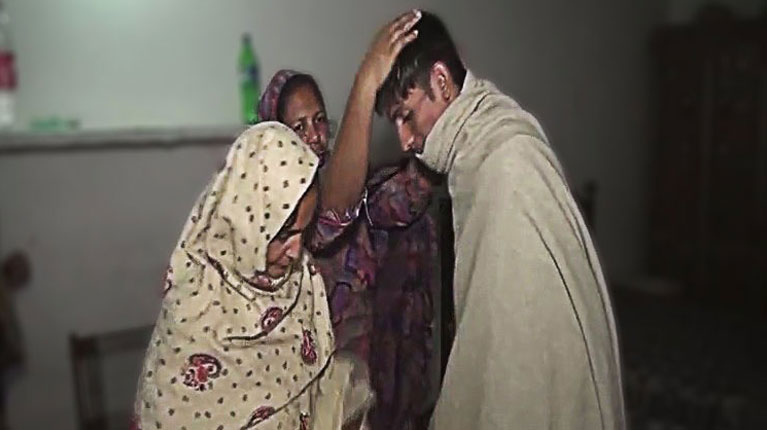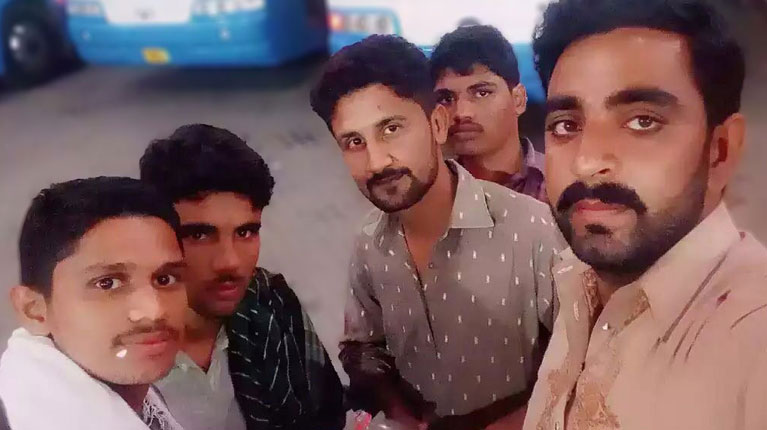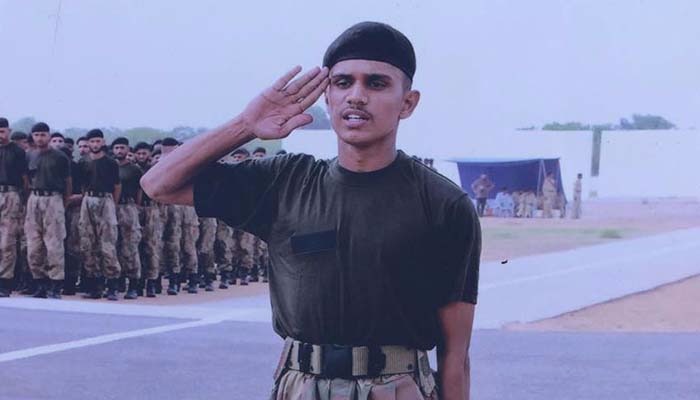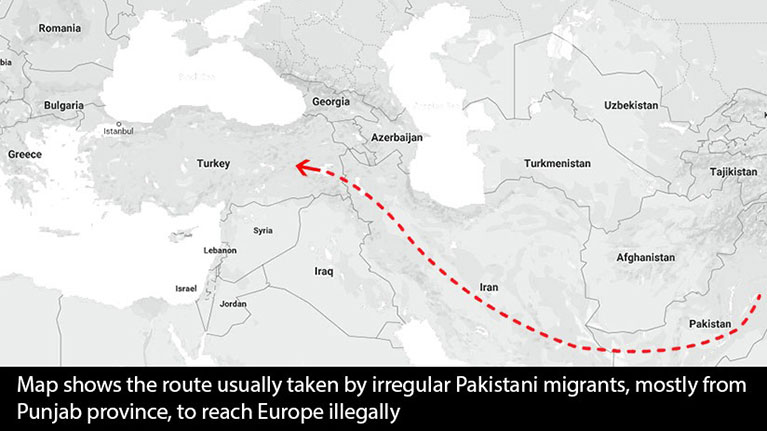TURBAT
IN MEMORIAM
In November 2017, twenty bullet-riddled bodies were discovered in Turbat, Balochistan. The victims were residents of Punjab who were attempting to reach Europe illegally via Iran.
Click images below for more details.
It would take a week, they were told. It would cost over Rs100,000 to travel from Punjab, through Balochistan before sneaking into Iran, then Turkey, and finally into Europe. Winter hadn't quite set in with all its rigour when the 20 men set off in small vehicles early November. The road to a better future would be long and arduous, they knew. But dangerous, they did not.
By mid-November, before the men had crossed Pakistan's borders, they were dead. Unidentified gunmen sprayed them and their vehicle with bullets near the mountainous region of Turbat in Balochistan. None survived.
A few days later, their bullet-ridden bodies were sent back home to the villages and cities they had hoped to escape. Their stories are tragic, but not uncommon. Every year, thousands of men, women, and children are illegally trafficked out of Pakistan with promises of safety and jobs. Some make it, others don't.
Geo.tv has compiled a list of the men whose bodies were found on November 15 and 18.

Abu Bakr

Abu Bakr, 20, lived in a village in Sialkot. He had heard of Akhtar, an agent, from the neighbouring village of Begowala, who helped young men like him travel to Europe. He paid Akhtar Rs135,000 prior to the journey.
Disclaimer: The information provided has been gathered from family sources and documents found with the deceased.
Ahsan Raza

Raza was an employee of a medical facility in Rasool Nagar, Gujranwala. His monthly salary was merely Rs8,000. A few years ago, the 29-year-old snuck out of Pakistan with the help of an agent, using an illegal route. Once in Tanzania, Africa, he struggled to find a job and was forced to return home. In November, he tried his luck again, this time certain that Europe would hold better prospects for him.
Disclaimer: The information provided has been gathered from family sources and documents found with the deceased.
Azhar Waqas

Waqas was a resident of Mandi Bahauddin, Punjab. The youngest of four brothers, he had always dreamt of settling out of Pakistan. Then, on November 1, without telling his family, he left his house to meet the agent who had promised to arrange his travel. But the 25-year-old neither reached his destination nor saw his family again.
Disclaimer: The information provided has been gathered from family sources and documents found with the deceased.
Badar Munir

Munir had lived in Saudi Arabia for six months, working odd jobs. This year, he returned home to his village in Jalalpur Jattan, Gujrat, and found work as a driver. The night before he left for Turbat, he met his parents, four brothers and sister. No one knew what he had planned.
Disclaimer: The information provided has been gathered from family sources and documents found with the deceased.
Danish Ali

Danish was to be married to his cousin in December. His old parents had high hopes for their only son. The 22-year-old from Gujrat had also served in the Pakistan Army for three years. Danish aspired to make more money to support his parents and two sisters, says his family. After he left his house in the last week of October, neither his parents nor his fiancée heard from him again.
Disclaimer: The information provided has been gathered from family sources and documents found with the deceased.
Ghufran Zahid

The third child among nine siblings, Ghufran took up the job of sewing leather in his hometown in Sialkot, when he could not find any better opportunity around. His family, like of most of the others' killed in the incident, was unaware of his plans. Ghufran paid an agent Rs150,000 for a one-way journey to Europe.
Disclaimer: The information provided has been gathered from family sources and documents found with the deceased.
Ghafoor Ahmed

Ahmed belonged a village in Sialkot, where he worked at a small leather processing factory. The monthly income he brought home barely met the expenses of his parents and three siblings.
Disclaimer: The information provided has been gathered from family sources and documents found with the deceased.
Ghulam Rasool Rabbani

Rabbani had always hoped to join his father in Spain, where the latter had been working since the last 25 years. The financial situation of his household did not demand him to take a perilous journey. But he was determined to move out of Pakistan and left his mother on November 2.
Disclaimer: The information provided has been gathered from family sources and documents found with the deceased.
Khurram Shehzad

The father of three was a resident of Mandi Bahauddin. Shehzad left his wife and children in October after paying an agent. He had hoped that Europe would provide a better paying job.
Disclaimer: The information provided has been gathered from family sources and documents found with the deceased.
Majid Ali

Majid, from Sambrial in Sialkot, had paid Rs135,000 to an agent. He and two others from the same village as his, Hyder Ali and Abu Bakr, left together. On reaching Quetta, Abu Bakr and Majid were put in one vehicle while Hyder was moved to another one.
Disclaimer: The information provided has been gathered from family sources and documents found with the deceased.
Muhammad Hussain Nazir

Muhammad Ilyas

Qasim Abbas

Qasim worked in Lahore, from where he took off on his journey. His parents found out about his plans only after he called from Quetta. They tried to convince him to return, but he was adamant. That was the last time they spoke to him.
Disclaimer: The information provided has been gathered from family sources and documents found with the deceased.
Saifullah

Earlier this year, Saifullah, the father of a three-year-old and two-year-old, left his village in Gujrat and began working as a tailor in Quetta. When an agent approached him, he took up the offer.
Disclaimer: The information provided has been gathered from family sources and documents found with the deceased.
Saqib

Saqib, who belonged to Khori Rasulpur, worked in a fruit market in Lahore. His parents and siblings were shocked to learn of his plans, when his lifeless body was returned to them.
Disclaimer: The information provided has been gathered from family sources and documents found with the deceased.
Tayyab Raza

Usman Qadir

For Qadir, the only brother of five sisters, finding work was a struggle. The 22-year-old, who hailed from Malikpur village in Gujrat, planned to travel to Europe with his friends to look for better opportunities.
Disclaimer: The information provided has been gathered from family sources and documents found with the deceased.
Waqas

Only brother of two sisters, Waqas had completed his matriculation. He was unemployed at the time he left his village in Daska tehsil of Sialkot, before being killed en route to Europe.
Disclaimer: The information provided has been gathered from family sources and documents found with the deceased.
Zafar Zahid

Zulfiqar Ali

A year after his daughter was born, Ali contacted an agent in Mandi Bahauddin. He paid him a hefty amount of Rs300,000 to be smuggled into Europe.
Disclaimer: The information provided has been gathered from family sources and documents found with the deceased.
SIALKOT: Chugging along together, on a rickety road, were two open trucks. The route was deserted, snaking through the towering mountains of Turbat, Balochistan.
But then, mid-way, one of the vehicles developed a mechanical fault. It pulled up on the side of the road, recalls Hyder Ali, who was one of the passengers on the truck. The truck ahead of them also slowed down. As the driver jumped out to check the engine, the silence of the mountains was punctured by the sound of rapid gunshots.
The vehicle in front of them was under attack. The passengers with Ali began to run frantically in all directions. “I along with Nabeel, who was the same age, took cover inside the truck,” Ali said while speaking to Geo.tv.
When the attackers had left, the two boys snuck of the truck and hid in nearby bushes. There they stayed in silence till the break of dawn. In the morning, the two, still unable to make sense of what had happened, ran until they reached a settlement area, where a tea vendor helped them reach out to their families in Sialkot and Gujranwala.
Whether it was the same day when the incident took place or later — it has yet to be ascertained — police recovered the bullet-ridden bodies of 15 men from the truck in Buleda area of Turbat. Five others were recovered from another spot nearby. As for the other passengers, neither Ali nor Nabeel know what happened to them. Or whether they survived.
Eighteen-year-old Ali had promised to pay his agent Rs135,000 on reaching his destination. Most of the others, who died, had already handed over the cash, being unaware of the dangers of the journey.
Before leaving his home, Ali ran a small poultry shop. His father sold vegetables in Sialkot. Both their incomes, combined, were barely enough to feed the family of six.
But now back home, Ali feels that he is lucky to at least be alive. His parents say they would not want to jeopardize their son's life to improve the financial condition of their household. They therefore advise young men to avoid taking such shortcuts that would end families mourning after their lives.
As per information received so far, 22 of the 30 men set off from the Punjab province to reach Quetta. From here, they were to illegally cross into Iran and then into Turkey before reaching Europe, where they hoped to live better lives.
GUJRANWALA: With the head of the household settled in Spain for over two decades, Ghulam Rasool Rabbani's family was not wary of letting him go abroad, even though they knew the method he had opted for did not come with a guarantee.
So with the dream to rise high, 25-year-old Rabbani started his journey on a dark path, which he thought would lead to a bright future.
Rabbani wanted to go to Spain to his father, however, unlike others who took the hazardous route to Europe, the financial situation of his household did not call for him to take a desperate measure. Since Rabbani’s father was working in Spain, he would send a sum which became sufficient when converted into rupees.
Moreover, he had a brother who was working in Saudi Arabia.
But the thought of earning foreign currency and living away from home made Rabbani overlook the perils that awaited him and others.
Rabbani had contacted an agent to take him to Europe via an illegal land route through Quetta and then Iran. His brother Kashif Chand said an agent known as Abid Hussain had guaranteed Rabbani a safe passage to Iran.
Therefore, on November 2, the young man from Gujranwala started his journey, only to return to his family in a coffin.
The practice of illegally crossing the borders of Iran onto Turkey and from there to Greece or other countries in Europe has been going on for decades, especially in Gujranwala. Authorities admit that agents like Hussain have been running such rackets which promise unsuspecting people a safe passage to Europe. But few make it through alive.

GUJRAT: At the start of November, 22-year-old Danish Ali, 28-year-old Badar Munir, 20-year-old Qasim Abbas, 17-year-old Saqib Ali and 22-year-old Usman Qadir were excited, anxious and looking forward to travelling to a foreign land and turning their lives around.
The five friends from Gujrat had been planning for months to travel to Europe in search of better opportunities. They had contacted an agent, identified as Kashif, who offered them safe passage to their destination.
Stemming from different backgrounds, all five had big dreams. They wanted to bear the financial burden of their families and improve their lifestyle.
Danish, Qasim and Saqib even belonged to the same village in Khori Rasulpur and had been friends since childhood. Soon Badar and Usman also joined them.
All five had their separate struggles and stories; Badar had recently returned from Saudi Arabia, Saqib was a fruit vendor in Lahore, Usman was the apple of his grandfather’s eye, Danish was going to get married in December and Qasim was a dutiful son.
While Danish, Badar, Saqib and Usman had hidden from their parents that they were travelling abroad, Qasim was the only one to keep his family in the loop.
During their stay in Quetta, Qasim called his father and informed him of their itinerary. His father sensed something being wrong and tried to convince his son to return home, but Qasim remained adamant. He kept assuring his father that everything will be fine. That is the last his family heard from him.
On November 15, their hopes and ambitions were all shattered as they become a target of terrorists, who opened fire on them while they were en route to Iran. Within minutes, the lives of their families changed forever.
The bodies of the five friends were found on November 18 from bushes in Tajban area of Turbat. Upon hearing the news, their families could not come to terms with the reality.

GUJRAT: Young and spirited, Danish Ali had planned on travelling to Europe with his closest friends, a month before his wedding, unaware of how his dreams would turn into a nightmare for his family.
One of the victims of the Turbat massacre, with his death the world around Danish’s family came crashing down as he was the only son and a brother of two sisters.
His house in Khori Rasulpur now echoes of his mother’s wails, who was in disbelief after she heard the news.
Twenty-two-year-old Danish got engaged to his paternal uncle’s daughter last year, his father told Geo News, adding that the wedding ceremony was scheduled to be held in December.
"Danish had left the house about 18 days ago,” shared his father the day his son’s body arrived home. “He did not make any contact with us. We were informed about Danish’s death by a police officer in the area.”
This, however, wasn’t the first time Danish had disappeared without telling his parents, he had joined the armed forces without informing them, his father said.
The young man served in the Pakistan Army for three years.

The migration of people from different parts of Pakistan, especially Punjab, is not a new phenomenon. Legally or illegally the movement of people across borders for labour has been taking place since decades.
A few years back, 13 people from Punjab and five from Khyber Pakhtunkhwa were found dead in Dasht area of Turbat. According to the district administration of Kech, where Turbat is situated, the 18 people were en route to Iran when they were shot at.
The authorities concerned had said these people were on the road that is usually taken to illegally cross into Iran – the route from Makran Coast to Dasht, from thereon to Turbat, then to Iran and beyond.
The day after the incident, eight were arrested over charges of human trafficking.
It mainly started in 1950s when the first group of Pakistanis, mostly from Azad Jammu and Kashmir and northern Punjab, moved to the United Kingdom to meet the demand for labour for construction. This is stated in a research by Kleopatra Yousef on immigration to Europe from Pakistan.
These people were mostly young men from peasant areas with barely any specialisation in their work, according to social anthropologist Pnina Werbner. The following period also saw a flow of qualified and educated people from the Pakistani middle class to Europe.
But people moving out of the country primarily were the ones from Gujrat in Punjab and Mirpur in Azad Kashmir. In 2010, 27,000 Pakistanis were living in Norway, most of whom were originally from Gujrat, according to architect Arif Hasan.
Then came the 1990s, which saw the flow of irregular movement to the countries of European Union. Many people, mostly men from the underdeveloped parts of the country moved to Europe through smuggling networks, states Yousef’s research. Some of these people managed to legalize their stay through the asylum system of the countries they migrated to.
Produced by:
Yasal Munim , ZahidunNisa
Reporting by:
Rana Ansar from Gujranwala, Riaz Rasik from Gujrat and Umar Ijaz from Sialkot
Additional input by:
Tariq from Mandi Bahauddin, Rashid Saeed from Quetta and Shahab Umer from Quetta
Developed by:
Hassan Faisal Saidi (IMM) and Mohsin Hussain (IMM)